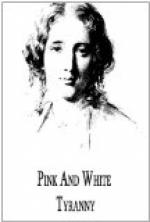“Believe me, dear sister, I never was so much your affectionate brother,
“John SEYMOUR.
“P.S.—I forgot to tell you that Lillie remarkably resembles the ivory miniature of our dear sainted mother. She was very much affected when I told her of it. I think naturally Lillie has very much such a character as our mother; though circumstances, in her case, have been unfavorable to the development of it.”
Whether the charming vision was realized; whether the little sovereign now enthroned will be a just and clement one; what immunities and privileges she will allow to her slaves,—is yet to be seen in this story.
CHAPTER II.
WHAT SHE THINKS OF IT.
Springdale was one of those beautiful rural towns whose flourishing aspect is a striking exponent of the peculiarities of New-England life. The ride through it presents a refreshing picture of wide, cool, grassy streets, overhung with green arches of elm, with rows of large, handsome houses on either side, each standing back from the street in its own retired square of gardens, green turf, shady trees, and flowering shrubs. It was, so to speak, a little city of country-seats. It spoke of wealth, thrift, leisure, cultivation, quiet, thoughtful habits, and moral tastes.
Some of these mansions were of ancestral reputation, and had been in the family whose name they bore for generations back; a circumstance sometimes occurring even in New-England towns where neither law nor custom unites to perpetuate property in certain family lines.
The Seymour house was a well-known, respected mansion for generations back. Old Judge Seymour, the grandfather, was the lineal descendant of Parson Seymour; the pastor who first came with the little colony of Springdale, when it was founded as a church in the wilderness, amid all the dangers of wild beasts and Indians.
This present Seymour mansion was founded on the spot where the house of the first minister was built by the active hands of his parishioners; and, from generation to generation, order, piety, education, and high respectability had been the tradition of the place.
The reader will come in with us, on this bright June morning, through the grassy front yard, which has only the usual New-England fault of being too densely shaded. The house we enter has a wide, cool hall running through its centre and out into a back garden, now all aglow with every beauty of June. The broad alleys of the garden showed bright stores of all sorts of good old-fashioned flowers, well tended and kept. Clumps of stately hollyhocks and scarlet peonies; roses of every hue, purple, blush, gold-color, and white, were showering down their leaves on the grassy turf; honeysuckles climbed and clambered over arbors; and great, stately tufts of virgin-white lilies exalted their majestic heads in saintly magnificence. The garden was Miss Grace Seymour’s delight




